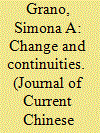|
|
|
Sort Order |
|
|
|
Items / Page
|
|
|
|
|
|
|
| Srl | Item |
| 1 |
ID:
134309


|
|
|
|
|
| Summary/Abstract |
In representative governments, a healthy turnover of power among ruling parties is viewed as a critical sign of democratic principles. In a political environment where voters’ opinion is the key political driver, the greatest challenge facing the NGO community is often that environmental concerns only represent secondary aspects of the policy-making process. This article focuses on the transformations (or lack thereof) in Taiwan’s environmental governance, under different political parties, particularly during the past few years. I begin with an overview of the key issues that have characterised Taiwan’s environmental movement and its battles, starting with the democratic transition of the mid-1980s, before focusing on two developmental projects – Taiwan’s eighth petrochemical plant and fourth nuclear power facility – to bring to light the most significant changes and continuities in the environmental-policy realm. I pay special attention to the post-2008 period and the ensuing renaissance experienced by the environmental movement, among others. The final section considers the consequences of the KMT’s second elect-oral victory – in January 2012 – for environmental policies and, in light of the article’s findings, summarises what has changed and what has consistently remained the same under different ruling parties.
|
|
|
|
|
|
|
|
|
|
|
|
|
|
|
|
| 2 |
ID:
146887


|
|
|
|
|
| Summary/Abstract |
For more than two decades, under the imperative of ‘developing the country at all costs’, local governments in China have allowed developers and industrialists to set up polluting industries which have had deleterious effects on citizens’ health and the natural environment. However, China appears to have entered a new phase of determined and concerted efforts on the part of both the authorities and the public to tackle environmental problems. The articles in this special issue of China Information examine the main strengths and weaknesses of China’s current system of environmental governance. The central questions linking the case studies reported here are concerned with whether and how environmental policies formulated at the central level are implemented at the local level and how different agents and interests, making use of the available legislative means, influence this implementation process. Engaging a range of political, economic, social and cultural perspectives, the five contributions in this collection concentrate on two broad issues: resolution mechanisms for public participation in environmental governance and the actual enforcement of environmental regulations.
|
|
|
|
|
|
|
|
|
|
|
|
|
|
|
|
| 3 |
ID:
146889


|
|
|
|
|
| Summary/Abstract |
In the last five years China has passed new regulations and formulated new policies to target urban smog. Accordingly, several cities have sought to improve their public transportation systems to reduce the number of motor vehicles on the streets. In 2011 in Nanjing, during the construction of Line No. 3 of the subway system, several long-standing London plane trees in the city’s historical area were targeted for transplantation. This article focuses on the tree-hugging protest which was triggered by this event in 2011–12. While protesters framed their actions as tree protection and heritage conservation, this article is particularly interested in participatory approaches available to protesters, in light of certain recent developments in the environmental regulatory framework in China. Specifically, this article analyses a relatively new and less well-known tool for popular participation known as ‘green assessment’.
|
|
|
|
|
|
|
|
|
|
|
|
|
|
|
|
|
|
|
|
|